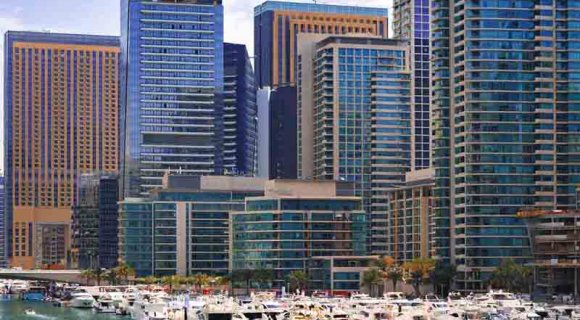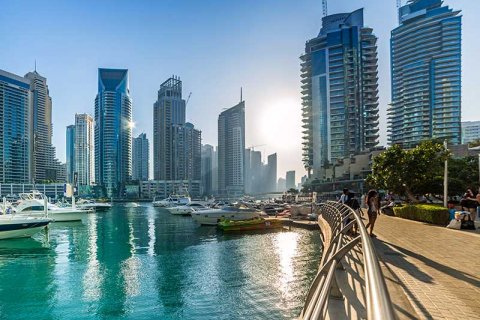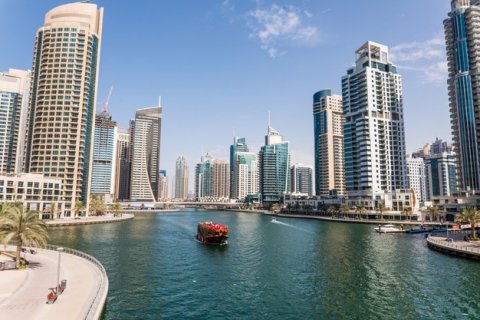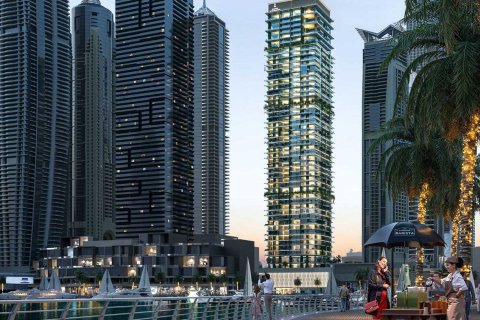
Traditions in the UAE are an integral part of the country’s culture and way of life. Passed down from generation to generation, these customs have become the foundation of the people’s identity and values. They encompass deep historical, religious, and sociocultural aspects, reflecting the hospitality of the native population, harmony with nature, and respect for moral norms.
Muslim traditions, customs, and rituals significantly differ from those formed in Western culture. Whether you are planning to buy property in Dubai or travel across the Emirates, having an understanding of the specific rules and norms will enhance your experience, ensuring a more pleasant and comfortable visit while helping you steer clear of common behavioural pitfalls.
Content:
- Introduction to the unique world of Arab customs and traditions
- Religion and faith
- Family values
- Holidays and celebrations
- Arab cuisine and traditional dishes
- Unusual traditions in UAE
- Search for property in the UAE only on Emirates.Estate!
Introduction to the unique world of Arab customs and traditions
To understand the overall context, we invite you to learn briefly about UAE culture from our article.
Every Arab region and country has its unique customs reflecting its peculiarities and historical heritage. Devotion to their roots is of importance to all Arab communities, manifested in preserving authentic folk crafts, music, dance, and clothing.
Arab traditions encompass various aspects of life, from family values and etiquette to festivities and religious practices. Hospitality, a cornerstone of the local ethos, is expressed in the warmth and openness with which people receive guests. Visitors receive the utmost care: they are always welcome in homes, treated to the finest dishes, and given maximum attention.
Studying traditions deepens one’s understanding of the local mindset and fosters mutual respect. The distinctive and vibrant nature of this culture are reasons why many travellers and scholars seek to explore and immerse themselves in this captivating world.
Religion and faith
The role of religion in the UAE is crucial. Islam is the primary faith of the Arab world, and its principles and laws influence many aspects of daily life. Muslims perform five obligatory prayers throughout the day, observe fasting during Ramadan, and undertake the pilgrimage to Mecca during Hajj. Religious holidays, including Eid al-Fitr and Eid al-Adha, are also filled with sacred rituals that bring together families and friends.
The influence of Islam extends to social, political, economic, and personal spheres of life. Faith is the foundation for shaping moral and ethical values that regulate the behaviour and relationships of people in society. It guides people in matters of justice, fairness, compassion, tolerance, and responsibility toward others.
For the Arabs, religion is an integral part of identity and sense of self. It serves as the basis for forming and maintaining social connections and solidarity within groups and communities. Rituals, mosque prayers, joint celebrations, and ceremonies become moments of unity and strengthening of mutual understanding.
Many Islamic states rely on religious principles in developing laws and shaping state policies.
Faith also plays an important role in personal and spiritual life. It acts as a source of hope, comfort, and inner peace in difficult times, helping people find purpose and meaning. It also provides direction and guidance in making important decisions.

Family values
Family values play a central and foundational role in the life of the Arab people. The family serves as the cornerstone of society and social structure, and the bonds between its members are considered sacred and inseparable.
In the UAE, a typical family often spans multiple generations, including parents, children, grandparents, and other close relatives. They form a strong and close-knit network based on mutual support, respect, and care for each other.
One of the fundamental aspects of Arab customs is the respect for elders and the support for younger family members. Parents actively engage in the spiritual upbringing of their children and the transmission of traditional values and moral principles. In turn, children are obligated to respect and listen to their elders, heed their advice, and provide support in times of difficulty.
Another important characteristic is solidarity and support. Relatives typically turn to each other for assistance in any situation, whether it be financial straits, health concerns, education issues, or personal matters. Time spent within the family circle holds great significance and is often filled with shared activities, celebrations, and travels.
Role of men and women
In the Arab world, the man, as the head of the family, is responsible for the protection and provision for his loved ones. He works and makes decisions on important matters. Men are also regarded as the protectors of relatives and their property.
Arab customs for women assign them the roles of caring mothers and homemakers. They are responsible for raising children, managing the household, and supporting family relationships. However, there has been a shift in this traditional role, and increasingly, more women are working and participating in public and professional life.
Holidays and celebrations
The UAE, like other Arab countries, observes a series of religious holidays that play a significant role in the country’s spiritual life. Islam is the state religion of the Emirates, and the native population is predominantly Muslim.
One of the major religious holidays celebrated in the Emirates is Eid al-Fitr, or the Festival of Breaking the Fast. It marks the end of the month of Ramadan and is declared after the conclusion of fasting. On this day, Muslims gather to pray at the mosque, exchange greetings and gifts, and visit relatives and friends, often organising picnics and savouring delicious dishes.
Another important holiday is Eid al-Adha, also known as the Feast of Sacrifice, celebrated at the end of the Hajj pilgrimage. In the Emirates, this holiday is a time for family gatherings and festive meals.
A significant religious event in the UAE is the month of Ramadan, during which Muslims fast from dawn to sunset. During this period, believers observe strict fasting and spend time in prayers and Quran readings. Special events and cultural programmes are organised in the country during this month.
In addition to these, the Emirates also celebrates various other Muslim and national holidays:
- National Day;
- Commemoration Day;
- Islamic New Year;
- Prophet Muhammad’s Birthday.
These holidays are marked by public events, family gatherings, parades, and firework displays.
Arab cuisine and traditional dishes
Arab cuisine is known for its richness of flavours, aromas, and a variety of ingredients. It reflects the historical heritage, UAE traditions, climatic conditions of the region, and cultural influences.
Here are the most common features of the cuisine and traditional dishes characteristic of the Emirates:
- Meat: Meat dishes, especially lamb, are common in the UAE. Kebabs, grilled, fried, and roasted meats are very popular. Traditional dishes such as mandi (roasted lamb with spiced rice) and harees (meat stew) are highly valued in the country.
- Rice and bread: Rice is a crucial component of dishes, often served with meat, fish, or vegetables. Biryani and mandi are considered essential parts of a traditional meal. Bread also plays a substantial role, with Arabs loving pita or khubz (traditional bread), often served with meals.
- International influences: Thanks to strengthened international connections and a stable flow of tourists, the country features dishes from Indian, Iranian, and Lebanese cuisines, such as kebabs, hummus, and falafel.
- Spices: Cardamom, cinnamon, ginger, turmeric, and black pepper are traditional spices used to make sauces, marinades, and curries.
- Desserts: A variety of treats can be found here, with popular ones including lokum (Turkish delight), baklava, and umm ali (traditional pudding). They are usually prepared with honey, pistachios, nuts, and seeds.
- Coffee and tea: Coffee and tea play a significant role in the culture, especially in hospitality traditions. Classic Arabic coffee is served with cardamom and saffron, while local tea is usually sweet and fragrant.
Unusual traditions in UAE
The UAE is a country with rich culture and traditions, including distinctive and unique customs. Here are some of them:
- Desert weddings: Many couples in the UAE choose to celebrate their nuptials on the sandy dunes. This creates a unique and unusual atmosphere.
- Camel racing: Some traditional festivals and events in the UAE include camel races. Participants compete in speed and agility, attempting to cover a certain distance in the desert.
- Arish (traditional wooden housing): In certain places in the UAE, particularly in the emirates of Sharjah and Ajman, you can see authentic buildings known as Arish. In the past, they were widely used as residential dwellings and storage units. They feature a unique architectural style.
These are just a few examples of the unusual traditions found in the UAE.

Search for property in the UAE only on Emirates.Estate!
Discover a variety of villas and apartments in Dubai from the region’s leading developers on Emirates.Estate! The catalogue is regularly updated with fresh offers from the most interesting locations in the country, with detailed descriptions and real photos.
If you need recommendations from a specialist, feel free to reach out to us through any means you find convenient.












































